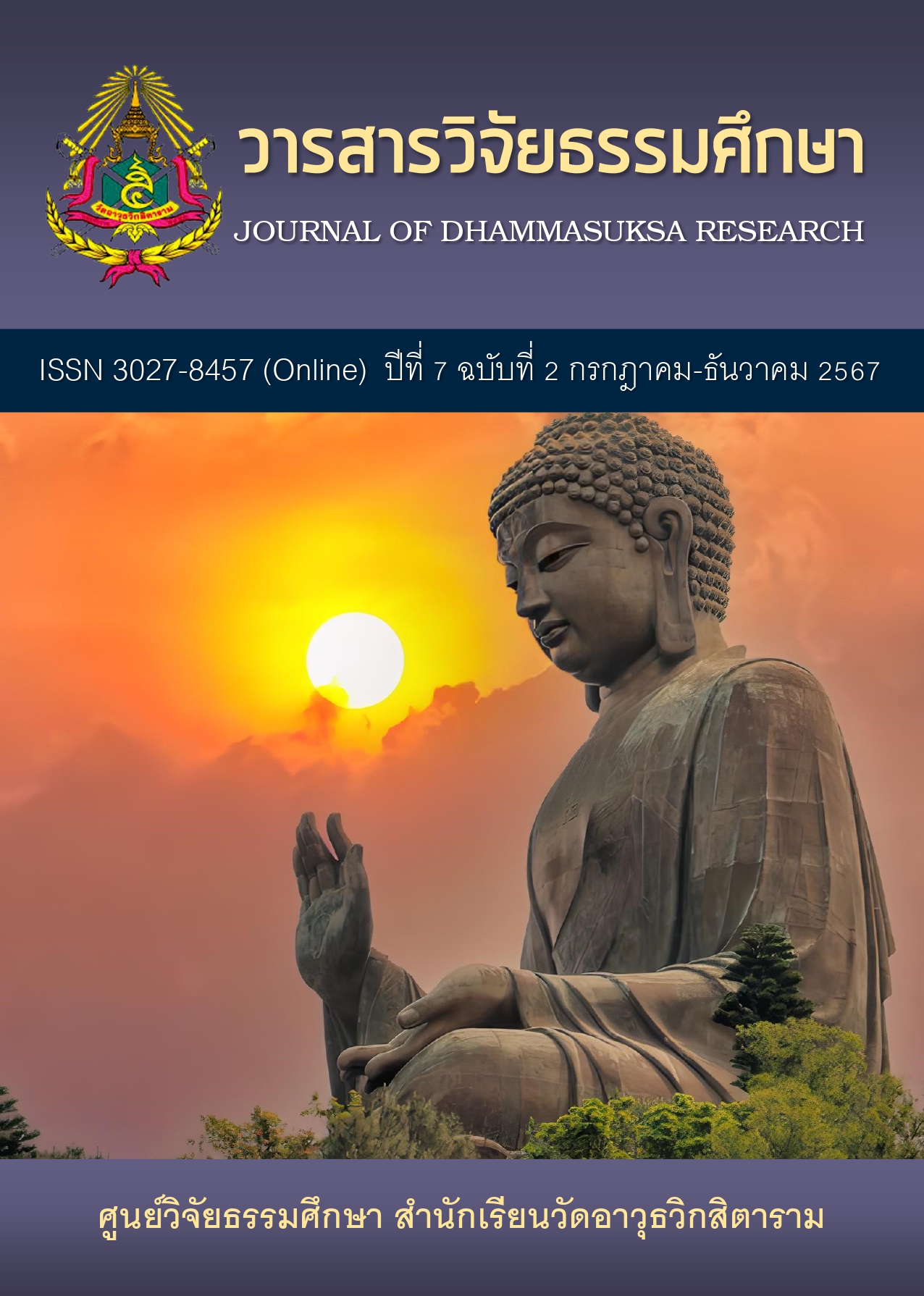ความชอบธรรมของปรัชญาเศรษฐกิจพอเพียงในฐานะปรัชญาเพื่อการพัฒนาชาติ
คำสำคัญ:
ปรัชญาเศรษฐกิจพอเพียง, ความชอบธรรม, การพัฒนาชาติบทคัดย่อ
การวิจัยนี้มีวัตถุประสงค์เพื่อเสนอปรัชญาเศรษฐกิจพอเพียงเป็นกระบวนทรรศน์ใหม่ในการพัฒนาอย่างยั่งยืน โดยใช้วิธีวิเคราะห์เชิงปรัชญาและการพูดคุยในวงเสวนาเพื่อหาข้อคิดเห็น ความรู้มาขยายข้อมูลในเชิงกรอบความคิดปรัชญา แล้วนำมาจัดหมวดหมู่ความคิดเชิงปรัชญาให้เหมาะสม ผลการวิจัยพบว่า ความชอบธรรมของปรัชญาเศรษฐกิจพอเพียงจึงต้องพิจารณาจากหลายด้าน ได้แก่ 1. ปรัชญาเศรษฐกิจพอเพียงในฐานะนโยบายของพระมหากษัตริย์เป็นความชอบธรรมทางศาสนาตามแนวคิดเทวสิทธิ์และเป็นพระโพธิสัตว์ที่จะทรงไว้ซึ่งเมตตาธรรม ยุติธรรมและบันดาลความสุข ความรุ่งเรืองแก่ประชาชน และมีลำดับความสัมพันธ์กับประชาชนในฐานะศูนย์กลางแห่งอำนาจ ประชาชนต้องเคารพเชื่อฟังและมีศรัทธาตามจารีตประเพณีโบราณ 2. ปรัชญาเศรษฐกิจพอเพียงในฐานะนโยบายของรัฐบาลเป็นความชอบธรรมทางรัฐศาสตร์ มีลักษณะเป็นสัญญาประชาคม เป็นอำนาจนำที่ปรากฏในแผนพัฒนาเศรษฐกิจและสังคมแห่งชาติต่อเนื่องยาวนาน และยังปรากฏอยู่ในแผนยุทธศาสตร์ชาติ 20 ปี (พ.ศ.2560-2579) การเชื่อมโยงศาสตร์พระราชากับการพัฒนาประเทศเพื่อให้การพัฒนาในทุกมิติมีการบูรณาการบนทางสายกลาง 3. ปรัชญาเศรษฐกิจพอเพียงในฐานะบทบัญญัติทางกฎหมายเป็นความชอบธรรมทางนิติศาสตร์ รัฐธรรมนูญแห่งราชอาณาจักรไทย พ.ศ.2560 มีบทบัญญัติอันเกี่ยวกับปรัชญาเศรษฐกิจพอเพียงบัญญัติไว้คือ หมวด 6 แนวนโยบายแห่งรัฐ มาตรา 75 วรรคหนึ่ง ทำให้เกิดบทบาทของความชอบธรรม กลไกต่างๆ ของสังคมทำงานไปได้ตามบทบัญญัตินั้น ความเป็นธรรมที่ส่งเสริมผ่านการทำให้ระบบกฎหมายเป็นไปในทิศทางเดียวกับความเป็นธรรมทางสังคมเป็นกระแสหลักของหลายประเทศ 4. ปรัชญาเศรษฐกิจพอเพียงในฐานะปรัชญาเป็นความชอบธรรมตามหลักปรัชญา ได้แก่ 1) อภิปรัชญาตามลัทธิทวินิยมและแนวคิดของปรัชญาหลังนวยุคสายกลางด้วย เน้นแนวทางการพัฒนาคุณภาพชีวิตที่ดีในวิถีชีวิตที่เป็นอยู่ในสภาวะปัจจุบันท่ามกลางความรู้ต่าง ๆ ที่แตกต่างหลากหลาย 2) ญานปรัชญาตามปรัชญาหลังนวยุคเสนอคำตอบที่สอดคล้องกับวิถีคิดของสังคมไทยว่าควรศึกษาย้อนอ่านให้หมด ไม่ควรละเว้น และควรคัดสรรเฉพาะส่วนที่ดีที่เหมาะสมกับวิถีชีวิตในปัจจุบันเพื่อการพัฒนาคุณภาพชีวิต 3) ปรัชญาจริยะมีความสอดคล้องในระดับเป้าหมายของปรัชญาเศรษฐกิจพอเพียง คือ มุ่งการพัฒนาคุณภาพชีวิตเพื่อให้บรรลุเป้าหมายสูงสุดของชีวิต การวิจัยนี้ชี้ว่าปรัชญาเศรษฐกิจพอเพียงจึงมีความชอบธรรมในการเป็นปรัชญาเพื่อการพัฒนาชาติอย่างเต็มที่และควรเผยแผ่ด้วยการชี้แจงเหตุผลเชิงปรัชญาในระดับสากล
เอกสารอ้างอิง
กีรติ บุญเจือ, รวิช ตาแก้ว, เอนก สุวรรณบัณฑิต, เมธา หริมเทพาธิป, สิริกร อมฤตวาริน. (2558). ความเป็นหลังนวยุคของปรัชญาเศรษฐกิจพอเพียง. รายงานวิจัย. กรุงเทพฯ: มหาวิทยาลัยราชภัฏสวนสุนันทา.
กีรติ บุญเจือ. (2551). คู่มือจริยศาสตร์ตามหลักวิชาการสากล. กรุงเทพฯ: ศูนย์ส่งเสริมและพัฒนาพลังแผ่นดินเชิงคุณธรรม สำนักงานบริหารพัฒนาองค์ความรู้
กีรติ บุญเจือ. (2546). ปรัชญาภาษาชาวบ้าน. กรุงเทพฯ: มหาวิทยาลัยเซนต์จอห์น.
ภัคสกุล นาคจู. (2551). ความชอบธรรมในการปกครองระบอบประชาธิปไตยของไทยผ่านจริยศาสตร์หลังนวยุคของภัคสกุล นาคจู. (2551). ความชอบธรรมในการปกครองระบอบประชาธิปไตยของไทยผ่านจริยศาสตร์หลังนวยุคของบอมัน. วารสารการศึกษาไทย. 4 (48): 14-21.
เมธา หริมเทพาธิป และ เอนก สุวรรณบัณฑิต. (2559). พัฒนาอย่างพอเพียงด้วยการมีส่วนร่วมเพื่อธรรมาภิบาล. ใน รวิช ตาแก้ว/ (บก.), ประเทศไทยกับธรรมาภิบาลด้วยปรัชญาเศรษฐกิจพอเพียง. (หน้า ๒๐๗-๒๘). กรุงเทพฯ : หลักสูตรปรัชญาดุษฎีบัณฑิต สาขาปรัชญาและจริยศาสตร์.
สิริกร อมฤตวาริน. (2558). ปรัชญาเศรษฐกิจพอเพียงกับความสุขแท้ตามความเป็นจริง: การศึกษาเชิงวิเคราะห์ วิจักษ์และวิธาน. วิทยานิพนธ์ปรัชญาดุษฎีบัณฑิต. มหาวิทยาลัยราชภัฎสวนสุนันทา.
สำนักงานคณะกรรมการพัฒนาการเศรษฐกิจและสังคมแห่งชาติ. (2560). แผนพัฒนาเศรษฐกิจและสังคมแห่งชาติ ฉบับที่สิบสอง พ.ศ. 2560-2564. กรุงเทพฯ, สำนักนายกรัฐมนตรี.
Bunchua, K. (2005). Dynamic heritage of Thais through five paradigms. In McLean, G. F. (Ed.), Cultural heritage and contemporary change series IIID (South east ASIA vol.3, pp. 267-73), Council for research in values and philosophy retrieved April 20, 2016, from http://www.crvp.org/book/Series03/IIID-3/front.htm
Bauman, Z. (1996). Postmodern ethics. Cambridge: Blackwell.
Calkins, P. (2009). Sufficiency economy matrices: Multi-period optimization for local development planners. J Econ Manage. 5(2) : 305-32.
Kantabutra, S. (2008) Development of the Sufficiency economy philosophy in the Thai business sector: Evidence, future research & Policy implications. Retrieved April 20, 2016, from http://sufficiencyeconomy.org
Isager, L., Ivarsson, S. (2010). Strengthening the moral fibre of the nation: The King’s sufficiency economy as etho-politics. In Ivarsson Editor. Saying the Unsayable. (pp. 223-39). Singapore, NIAS.
Morkuniene J. (Ed.). (2004). Social philosophy, paradigm of contemporary thinking. Cultural heritage and contemporary change series IVA, Eastern and Central Europe Vol.23. Council for research in values and philosophy. Retrieved April 20, 2016, from http://www.crvp.org/book/Series04/IVA-23/contents.htm.
Noy, D. (2011). Thailand’s sufficiency economy: Origins and comparisons with other systems of religious economics. Social Compass. 58(4): 593-610.
UNESCO. (2012) Towards a suffiecncy ecomomy: a new ethical paradigm for sustainability. retrieved April 20, 2013, from http:// http://www.unesco.org/new/en/social-and-human-ciences/themes/anticipation-and-foresight/unesco-future-lectures/towards-a-sufficiency-economy.
UN Secretary-General office. (2006). Thai king’s development agenda, visionary thinking inspiration to people everywhrere, Say Secretary-General to Bangkok Panel. Retrieved April 20, 2013, from http://www.un.org/press/en/2006/sgsm10478.doc.htm.
Wibulswasdi, C., Piboolsravut, P., Pootrakool, K. (2009). Sufficiency economy philosophy and development. Bangkok: The Crown Property Bureau.
ดาวน์โหลด
เผยแพร่แล้ว
รูปแบบการอ้างอิง
ฉบับ
ประเภทบทความ
หมวดหมู่
สัญญาอนุญาต
ลิขสิทธิ์ (c) 2024 วารสารวิจัยธรรมศึกษา

อนุญาตภายใต้เงื่อนไข Creative Commons Attribution-NonCommercial-NoDerivatives 4.0 International License.



